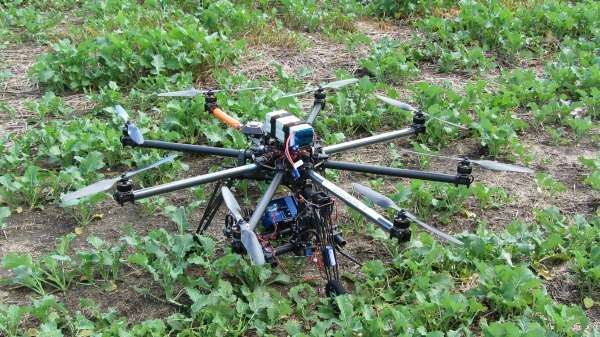Drones diagnose plant health and decrease insecticide use

Drones, or unmanned aerial vehicles (UAVs), are playing the role of medical doctor and are now able to diagnose the stress levels of plants, which could lead to less insecticide use.
Quirky as it may sound, stress in plants is a key factor in their susceptibility to pest attacks.
For commercial grain crops, this can have a massive impact on results.
Plants can be stressed for any number of reasons, but one of the most common is a nutrient deficiency, according to Department of Agriculture and Food WA research scientist Dusty Severtson.
"In particular, previous studies have found plants deficient in potassium will be more susceptible to attacks from pests, such as aphids," he says.
The Technology
The stress levels of individual plants in canola fields have been assessed using advanced imaging technology from a drone (an eight-rotor octocopter), mounted with a multi-sensor camera.
Researchers could see which areas in the field have the poorest plant growth, by studying the camera images, and the wavelengths of light given off by the plants.
The cell structures of plant leaves strongly reflect near-infrared light when they are hit by sunlight. The more infrared light is reflected, the more leaves a plant has, thus indicating its health.
The UAV imaging was most accurate (99.9 per cent) at detecting potassium-deficient canola at 120 metres above ground level, about four months after seeding.
In the study, plants deficient in potassium showed less biomass and much higher green peach aphid infestations.
What does this mean for insecticide use?
Mr Severtson says the regions can then be targeted for early detection of pests and disease and, if the results from the study are ground-truthed, may also allow for targeted insecticide applications.
Mr Severtson hopes the findings from his research project will encourage farmers to use insecticides more sparingly in the future.
"Not only will this technology save farmers money, but it will also reduce the blanket application of insecticides across the farm resulting in mitigation of insecticide resistance and promotion of beneficial predator insects in unsprayed areas of crop," he says.
However, while Mr Severtson says the UAV imaging technology is more accurate than satellite technology, it iss still early days in terms of applying it on-farm.
"One of the biggest hurdles is that we are still producing "Big Data", meaning we are receiving huge amounts of information and farmers are really only looking for one or two simple findings from this technology," he says.
Provided by Science Network WA
This article first appeared on ScienceNetwork Western Australia a science news website based at Scitech.




















